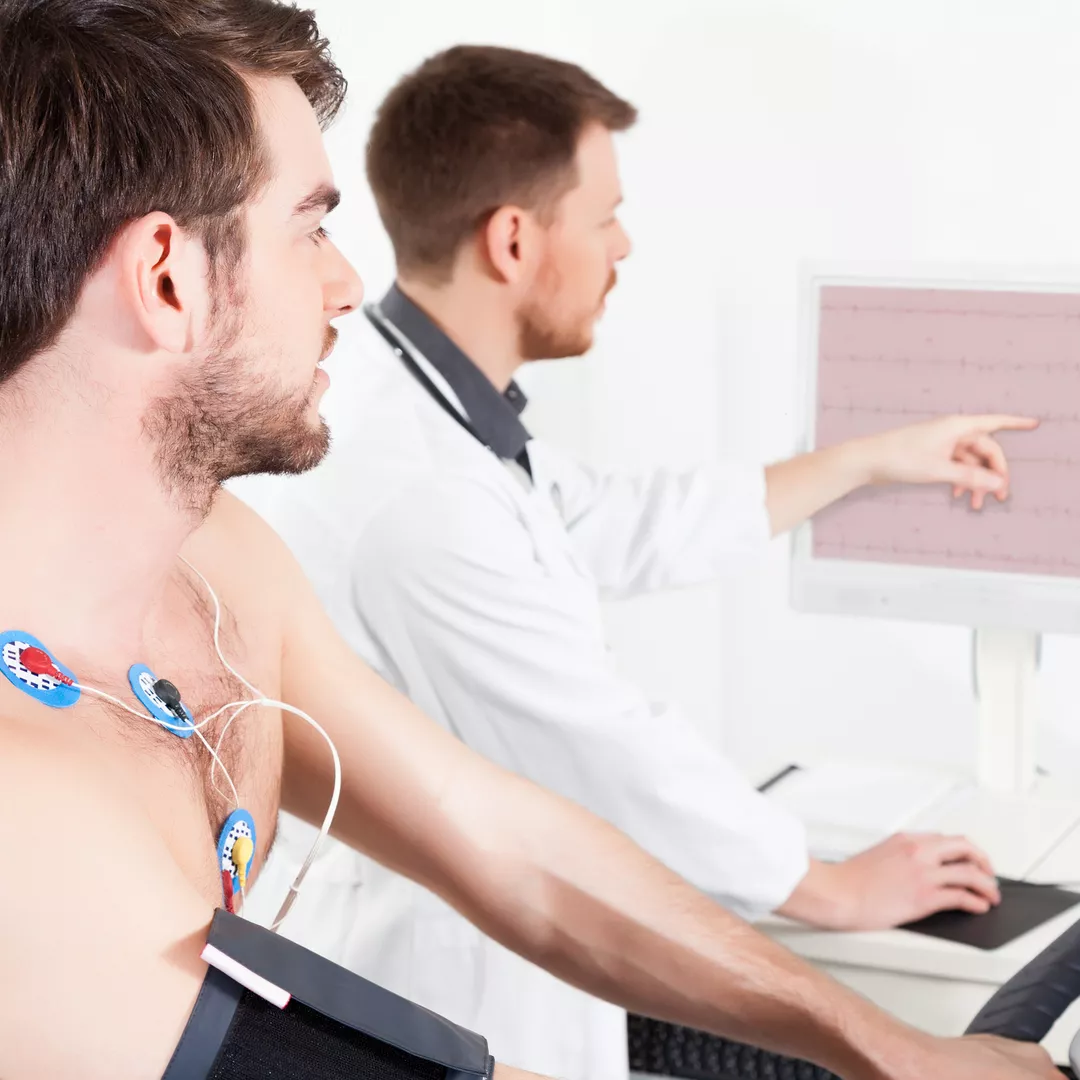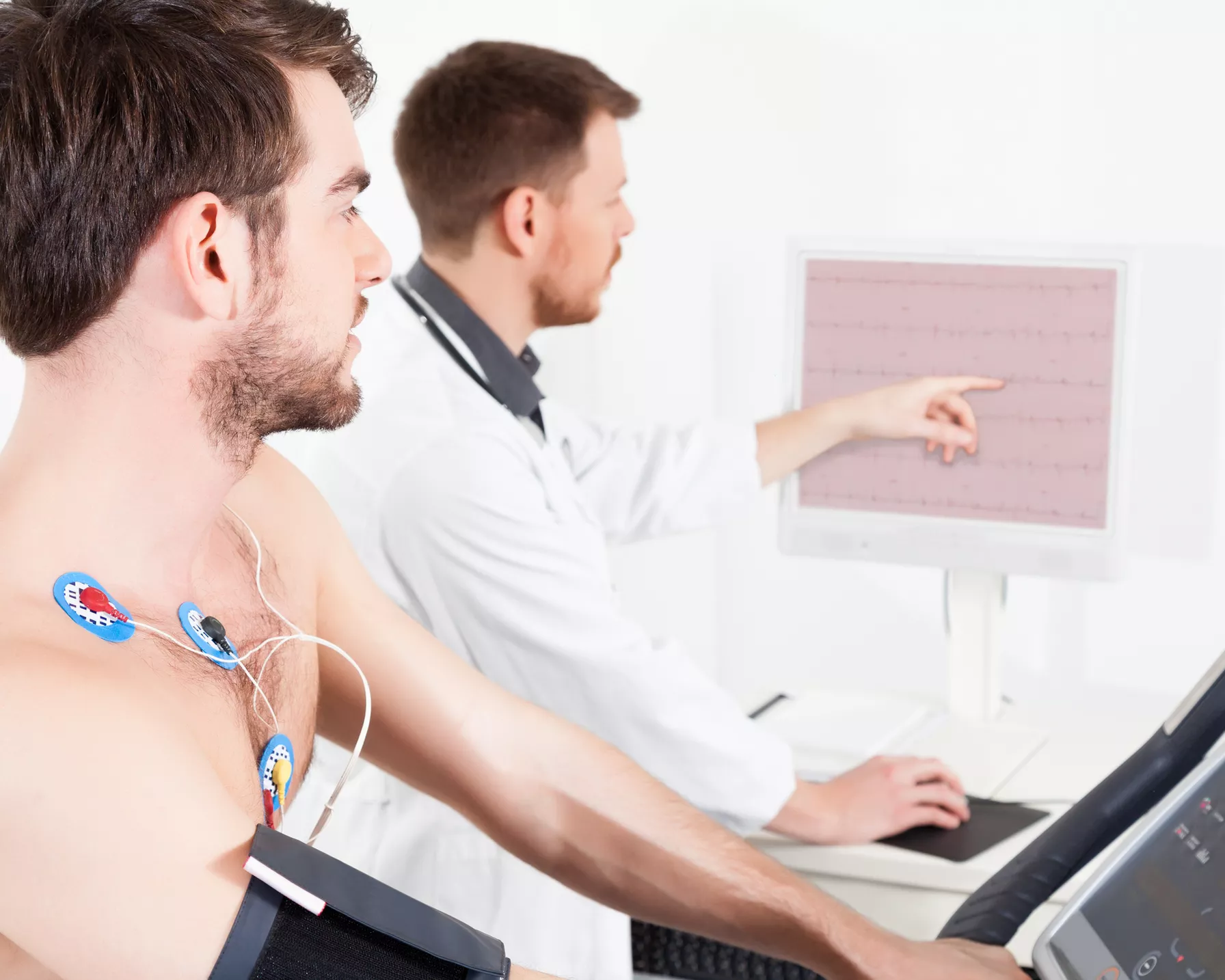What is a heart stress test?
A heart stress test shows how well your heart works during physical activity. It is sometimes also referred to as an exercise stress test or exercise electrocardiogram (ECG).
Typically, you will be asked to walk on a treadmill while a doctor measures how well your heart can cope with the increasing workload. As your body works harder, the heart must pump harder and faster. The test can reveal if there are any blood flow problems with your heart.
Taking a stress test also helps your doctor know what kind and level of physical activity is right for you.
The results of your stress test may help your healthcare professional decide if you have heart disease, and if so, how severe it is.
What is monitored during the test?
• Your heart rate
• Your breathing
• Your blood pressure
• Your heart’s electrical activity
• How tired you feel
Signs you might need a stress test
Your doctor may recommend a stress test if you have symptoms of coronary artery disease or an irregular heart rhythm (arrhythmia), such as atrial fibrillation.
The test will allow them to:
- Identify the cause of chest pain – as well as shortness of breath, dizziness and light-headedness.
- Diagnose possible coronary artery disease – if you’re showing signs and symptoms.
- Check the effectiveness of certain procedures – such as coronary angioplasty and stenting.
- Help create a safe exercise plan – if you have heart disease risk factors.
- Identify any heart rhythm changes – usually experienced during exercise.
- Determine your risk of heart disease – or other heart-related conditions.
How do I prepare for a stress test?
- You should wear comfortable, loose-fitting clothing and walking shoes.
- Tell your doctor about any medications you take. They may ask you not to take them before the test. Do not stop taking medications unless asked to do so.
- You may be asked not to eat, drink or smoke at least three hours before the test.
- You may drink water.
What happens during a stress test?
After asking you a series of questions, the doctor will place electrodes on your chest and arms to record your heart’s rhythm – the wires are connected to an ECG machine. A cuff on your arm will also check your blood pressure. You may be asked to breathe into a tube for a couple of minutes.
If you’re not able to exercise, you’ll get medicine through an intravenous (IV) line in your arm.
During the test, you will walk on a treadmill or cycle on an exercise bike until you reach your target heart rate – which is 85 per cent of the maximum heart rate predicted for your age. Every three minutes the speed, incline and resistance of the treadmill will increase, up to 15 minutes maximum.
Your doctor or other healthcare professional will monitor your ECG, heart rate, blood pressure and heart rhythm during this time.
You will be closely monitored throughout and doctors will stop the test if you develop chest pain, become too fatigued or develop any other symptoms of concern.
There is very little risk with a stress test.
How long does a stress test take?
The test takes less than one hour in total. You will be exercising for a maximum of 15 minutes, depending upon your age and fitness level.
A stress test shows how the heart works during physical activity.
What is the normal heart rate during a stress test?
When you exercise for a stress test, a doctor will identify a target heart rate. Your age is a significant determining factor for this heart rate. Most doctors will challenge you to exercise at such a level you achieve 85 per cent of your age-related maximum heart rate.
Your maximum heart rate is calculated by subtracting your age from 220.
Here is your expected stress test heart rate by age.
| Age | Target heart rate zone 50-85% | Average maximum heart rate 100% |
|---|---|---|
| 20 years | 100-170 beats per minute (bpm) | 200 bpm |
| 30 years | 95-162 bpm | 190 bpm |
| 35 years | 93-157 bpm | 185 bpm |
| 40 years | 90-153 bpm | 180 bpm |
| 45 years | 88-149 bpm | 175 bpm |
| 50 years | 85-145 bpm | 170 bpm |
| 55 years | 83-140 bpm | 165 bpm |
| 60 years | 80-136 bpm | 160 bpm |
| 65 years | 78-132 bpm | 155 bpm |
| 70 years | 75-128 bpm | 150 bpm |
Factors a doctor is looking for while your heart rate goes up include:
- if you have chest pain while you exercise
- if you have ECG changes that indicate your heart isn’t getting enough oxygen
- if your blood pressure goes up too much.



